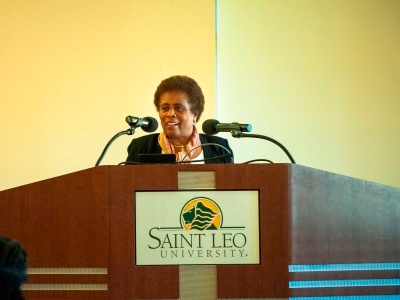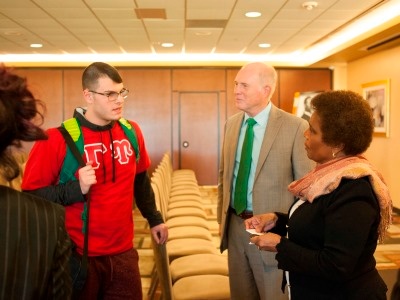Florida Supreme Court Justice Discusses Poverty Among American Youth
Justice Peggy Quince spoke to attendees on Martin Luther King Jr. Day at Saint Leo.

Justice Peggy Quince spoke to attendees on Martin Luther King Jr. Day at Saint Leo.

 Justice Peggy Quince, who grew up poor in rural Virginia, and eventually became a Florida Supreme Court Justice, spoke to an audience at Saint Leo University on Monday about combatting poverty among American youth. Her presentation was held in conjunction with University Campus' celebration of Martin Luther King Jr. Day.
Justice Peggy Quince, who grew up poor in rural Virginia, and eventually became a Florida Supreme Court Justice, spoke to an audience at Saint Leo University on Monday about combatting poverty among American youth. Her presentation was held in conjunction with University Campus' celebration of Martin Luther King Jr. Day.
She was appointed to the Florida Supreme Court in 1998 and served as chief justice for two years (2008-2010), making her the second African-American and third women to serve in that role. She previously served as a judge with the 2nd District Court of Appeal, the first African-American female to be appointed to one of the district courts of appeal.
Like the late civil rights leader, Justice Quince is a proponent of overcoming racial segregation and discrimination. She is particularly passionate in emphasizing the importance of voting and encouraged attendees to exercise their constitutional right and privilege.
"We saw how pivotal our state was in the 2000 presidential election where it was decided by a few hundred votes in Florida," said Justice Quince, a graduate of Howard University and the Catholic University of America's law school. "It's our obligation to register to vote and to vote regularly. Your vote really does count."
Justice Quince discussed the purpose of the holiday and said we should recognize and evaluate what Dr. King did. She used the analogy of issues occurring presently that would equate to those during Dr. King's time. She listed immigration, gay rights, killings by police, and the widening economic gap in this country as current examples.
"Dr. King not only fought for civil rights but economic justice as well. Most people don't realize that the March on Washington in 1963 was actually called "A March for Jobs and Freedom," she stated.
 A self-professed NPR (National Public Radio) junkie, Justice Quince relayed a story she heard recently about a discussion on implementing a national guaranteed income for all Americans. "Economic disparities still exist, and there is a lot of poverty and low income people in this country. The number of black children living in poverty (annual income less than $23,500/year) in America is 38 percent. In Florida it is 24 percent," she remarked. "The poor are not all lazy and shiftless. Two-thirds of people considered poor, work either full or part time. It's virtually impossible for a family of four to subsist on that amount of money, yet many people begrudge them welfare."
A self-professed NPR (National Public Radio) junkie, Justice Quince relayed a story she heard recently about a discussion on implementing a national guaranteed income for all Americans. "Economic disparities still exist, and there is a lot of poverty and low income people in this country. The number of black children living in poverty (annual income less than $23,500/year) in America is 38 percent. In Florida it is 24 percent," she remarked. "The poor are not all lazy and shiftless. Two-thirds of people considered poor, work either full or part time. It's virtually impossible for a family of four to subsist on that amount of money, yet many people begrudge them welfare."
What are the aftereffects of poverty? According to Justice Quince, who grew up one of five children of a single parent, it can lead to crime, drug use, and abuse and neglect. "Poverty is considered by some to be the greatest factor for foster care placements. Children in foster care are some of the most vulnerable in our society." Individuals get out of foster care by reunification, adoption, or aging out of the system at 18 or 19.
She is a champion of foster parents, adoption, and mentoring. She wants to make a difference in helping young people – "the future of this country." She has recruited lawyers and lay people to be an advocate by serving as volunteer guardians ad litem when a child is 16 and 17. "You can even adopt as a single person. You just need the wherewithal and the heart." On mentoring: "Our youth need strong role models to help them navigate life. There's so much we can do."
With her quiet strength, and down-to-earth personality, Justice Quince closed with one of Dr. Martin Luther King Jr.'s famous quotes regarding life's most persistent and urgent question: "What are you doing for others?" Using the acrostic ACT, she left the audience with this important message:
A – be aware of what's happening in your community;
C – have the courage to do something about it;
T – take action to make a difference! Be passionate, prepared, and persistent!
"Don't let anyone steal your dream," she concluded.